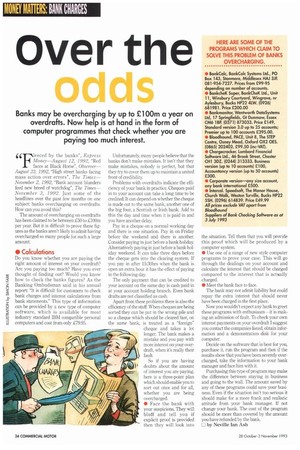Over the foc144....
Page 36

If you've noticed an error in this article please click here to report it so we can fix it.
Banks may be overcharging by up to £100m a year on overdrafts. Now help is at hand in the form of computer programmes that check whether you are paying too much interest.
F “ leeced by the banks", Express Money—August 12, 1992, "Red faces at Black Horse", Observer— August 23, 1992, "High street banks facing mass action over errors", The Times— November 2, 1992, "Bank account blunders feed new breed of watchdog", The 7'imesNovember 3, 2992. Just some of the headlines over the past few months on one subject: banks overcharging on overdrafts. How can you avoid this? The amount of overcharging on overdrafts has been claimed to be between £50 to £100m per year. But it is difficult to prove these figures as the banks aren't likely to admit having overcharged so many people for such a large amount.
• Calculations
Do you know whether you are paying the right amount of interest on your overdraft? Are you paying too much? Have you ever thought of finding out? Would you know how to check the banks figures? As the Banking Ombudsman said in his annual report: "It is difficult for customers to check bank charges and interest calculations from bank statements." This type of information can be provided by a new type of computer software, which is available for most industry standard IBM compatible personal computers and cost from only £79.95. Unfortunately, many people believe that the banks don't make mistakes. It isn't that they make mistakes, nobody is perfect, but that they try to cover them up to maintain a united front of credibility. Problems with overdrafts indicate the efficiency of your bank in practice. Cheques paid in to your account can take a long time to be credited. It can depend on whether the cheque is made out to the same bank, another one of the big four. a Scottish or Irish bank. Add to this the day and time when it is paid in and you have another delay. Pay in a cheque on a normal working day and there is one situation. Pay in on Friday before the weekend and there is another. Consider paying in just before a bank holiday Alternatively paying in just before a bank holiday weekend. It can take three days before the cheque gets into the clearing system. If you pay in after 15:30hrs when the bank is open an extra hour it has the effect of paying in the following day. The only payment that can be credited to your account on the same day is cash paid in at your account holding branch. Even bank drafts are not classified as cash. Apart from these problems there is also the efficiency of the staff. When cheques are being sorted they can be put in the wrong pile and so a cheque which should be cleared fast, on the same hank, is treated as a "foreign" cheque and takes a lot longer. The bank makes a mistake and you pay with more interest on your overdraft, when it's really their fault. So if you are having doubts about the amount of interest you are paying, here is a three-point plan which should enable you to sort out once and for all, whether you are being overcharged. • Face the bank with your suspicions. They will bluff and tell you if explicit proof is provided then they will look into the situation. Tell them that you will provide this proof which will be produced by a computer system. • Use one of a range of new style computer programs to prove your case. This will go through the dealings on your account and calculate the interest that should be charged compared to the interest that is actually charged. • Meet the bank face to face. The bank may not admit liability but could repay the extra interest that should never have been charged in the first place. Now you wouldn't expect any bank to greet these programs with enthusiasm—it is making an admission of fault. To check your own interest payments on your overdraft I suggest you contact the companies listed, obtain information and a demonstration disk for your computer. Decide on the software that is best for you, purchase it, run the program and then if the results show that you have been severely overcharged, take the information to your bank manager and face him with it. Purchasing this type of program may make the difference between staying in business and going to the wall. The amount saved by any of these programs could save your business. Even if the situation isn't too serious it should make for a more frank and realistic attitude from your bank manager. If not change your bank. The cost of the program should be more than covered by the amount you have refunded by the bank.
Li by Neville Ian Ash
































































































